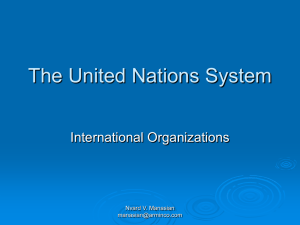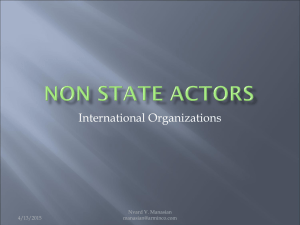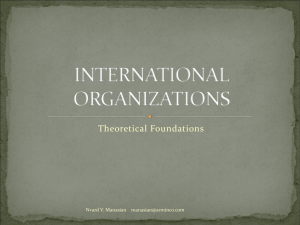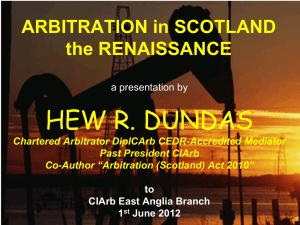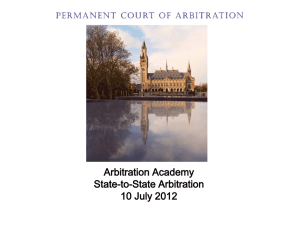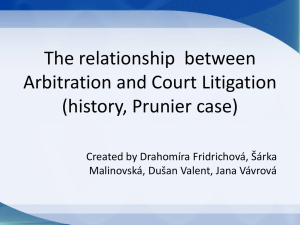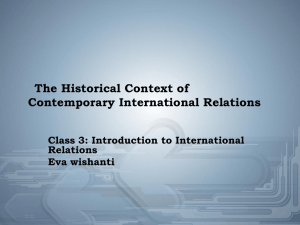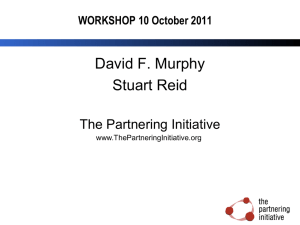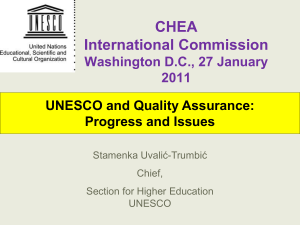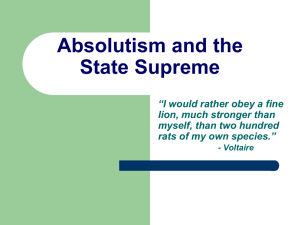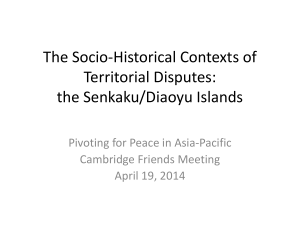Foundations of Pieces of Global Governance
advertisement
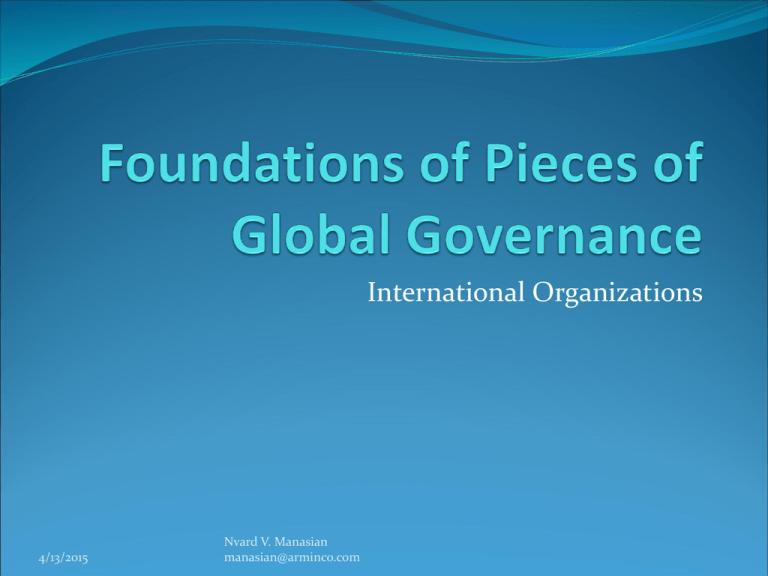
International Organizations 4/13/2015 Nvard V. Manasian manasian@arminco.com Governance is as Old as Civilizations The rules and norms functioned long before the 19th century Chinese and Indian Civilizations tried to manage and eliminate conflict The Greeks established protective alliances among city-states that were sovereign The medieval Europe thought that political alliances were needed against the violators of agreed norms Italy (14-15 century) of Renaissance period had agglomerated small cities into political units of Kingdom of Naples, Venice, Florence, etc. 4/13/2015 Nvard V. Manasian manasian@arminco.com The Rise of the State System Holy Roman Empire-1000AD Thirty Years War – 1618-1648AD The war was fought primarily (though not exclusively) in Germany and at various points involved most of the countries of Europe. • a religious conflict between Protestants and Catholics • the internal politics and balance of power within the Empire 4/13/2015 Nvard V. Manasian manasian@arminco.com The Peace of Westphalia: The New Order of Europe The Peace of Westphalia resulted from the first modern diplomatic congress and initiated a new order in central Europe based on the concept of state sovereignty with Territorial Integrity, secular authority and equal participation in international system. 4/13/2015 Nvard V. Manasian manasian@arminco.com Westphalians against Grotians In defining the modern state system •States are sovereign •Their territorial integrity is intact •The rule of law •The states are secular or laic •There is no supreme arbiter among states • States do not have complete freedom to do whatever they wish • State sovereignty is contested constantly •States are vulnerable to the demands posed by the forces that decentralize and globalize International trade, migration, democratization and technological innovation transformed the 19th century reality giving rise to IOs. 4/13/2015 Nvard V. Manasian manasian@arminco.com Governance Innovations: 19th century Increased trade Concept of Europe: Establish in 1815, based on multilateral meetings of superpowers of Europe, met over 30 times before WWI The Hague System: Generalized conferences, where all states where invited to solve problems, such as piece keeping in a time of piece. This brought about the mechanism of arbitration The WWI stood as a proof of the volatility and vulnerability of the emerging multilateralism 4/13/2015 G7 countries Canada France Germany Italy Japan United Kingdom United States Nvard V. Manasian manasian@arminco.com Public International Unions: The Industrial Revolution posed challenges that was not confined to one state, such as health hazards, shipment of mail, usage of telegraph. This gave rise to UPU, ITU. The Labor movement brought about ICC, Interpol Growing state interaction Multilateralism: 20th century The League of Nations of Woodrow Wilson 1. Was to prevent War, 2. Respect the territorial integrity and political independence of states 3. Settle disputes or enforce them on violators The Treaty of Versailles was one of the peace treaties at the end of World War I. It ended the state of war between Germany and the Allied Powers. 4/13/2015 4. It had a Council, Assembly and Secretariat 5. Plus Permanent Court of International Justice 6. And International Labor Organization 7. The League succeeded when states wanted action and failed when the great powers did not want to follow its principles 8. It also failed to address the great depression of the 1930s Nvard V. Manasian manasian@arminco.com Functionalism and Specialized Organizations The founders of the UN envisaged that functional agencies would play key roles in activities aimed at economic and social advancement Health WHO Science UNESCO Education UNICEF/UNESCO Culture Economics Food UNESCO WB/IMF FAO/WFP Other UN related functional organizations: ILO, UNHCR, ITU, WMO, UPU, IAEA, IMO Other functional organization: OPEC Regional Functional organization: OAPEC, ADB, IADB, PAHO, AMF 4/13/2015 Nvard V. Manasian manasian@arminco.com Functionalism and Specialized Organizations: Bretton Woods Market liquidity is a business, economics or investment term that refers to an asset's ability to be easily converted through an act of buying or selling without causing a significant movement in the price and with minimum loss of value. The Depression of 1930s collapsed the 4/13/2015 economies Countries raised barriers to trade and used “beggar thy neighbor” policies Recovery and rebuilding of Europe after WWII: Marshal Plan US promoted a vision of open international economy Keynes proposed a global central bank to deal with liquidity problems United States vs. Europe in setting liberalized trade standards, resulting in GATT later to become the WTO Nvard V. Manasian manasian@arminco.com Trends in Functional Organizations Technical GATT High IAEA IMF ITU WHO Functional Low 4/13/2015 Developmental UN Conference on Trade and Development Nvard V. Manasian manasian@arminco.com Politically contending area ILO Global Conferences League of Nations convened global conferences on economic affairs and disarmament Focus on salient issues of the day One type of GC is to negotiate a treaty among states, i. e. a 9 year long protracted negotiation among the states that brought about the ratification of the Law of the Sea Convention Another one is to have series of meetings with various state and non state actors around a possible agenda, i. e. Agenda 21 or CEDAW following Beijing summit in 1995 4/13/2015 Nvard V. Manasian manasian@arminco.com International Courts of Adjudication and Dispute Settlement The International Criminal Court is a permanent tribunal to prosecute individuals for genocide, crimes against humanity, war crimes. The International Court of Justice is the primary judicial organ of the United Nations. It is based in the Peace Palace in The Hague, Netherlands. Its main functions are to settle legal disputes submitted to it by member states and to give advisory opinions on legal questions submitted to it by duly authorized international organs, agencies, and the UN General Assembly. The Court of Justice of the European Communities, usually called the European Court of Justice (ECJ), is the highest court of the European Union (EU). It has the ultimate say on matters of EU law in order to ensure its equal application across all EU member states. 4/13/2015 Nvard V. Manasian manasian@arminco.com The resolution of disputes under international commercial contracts is widely conducted under the auspices of several major international institutions and rule making bodies. The most significant are: International Chamber of Commerce (ICC), International Centre for Dispute Resolution (ICDR), the international branch of the American Arbitration Association), London Court of International Arbitration (LCIA), Singapore International Arbitration Centre (SIAC). Where are the challenges of Multilateralism? 4/13/2015 Nvard V. Manasian manasian@arminco.com
